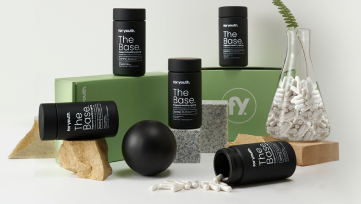Resveratrol Impact on Skin Microbiome and Dermal Health


 Shop our Resveratrol
Shop our Resveratrol 
Resveratrol, a compound found in various plants, has garnered significant attention in dermatological research for its potential to revolutionize skincare. This polyphenol’s ability to modulate the skin microbiome and enhance dermal health presents a promising avenue for addressing various skin concerns. From its antimicrobial properties to its capacity for strengthening the skin barrier, resveratrol offers a multifaceted approach to skin health. As we explore the intricate relationship between this compound and our skin’s ecosystem, we uncover a wealth of possibilities for future dermatological applications and treatments.
Exploring the diverse benefits of resveratrol, this potent anti-aging compound has gained acclaim, especially its variations such as trans-resveratrol, which are research-backed to provide significant health advantages. Studies suggest that resveratrol may also play a role in promoting weight loss, enhancing cardiovascular health, and offering cancer-preventive properties. Furthermore, the anti-inflammatory effects of resveratrol could make it instrumental in managing chronic diseases, including acting as a potential diabetes aid. Its ability to possibly extend lifespan only adds to its allure, marking it as a breakthrough ingredient in both skincare and holistic health circles.
Understanding Resveratrol and Skin Microbiome
Resveratrol, a polyphenolic compound found in various plants, has garnered significant attention for its potential effects on the skin microbiome and overall dermal health. This antioxidant, primarily derived from grapes and berries, interacts with the diverse microbial ecosystem residing on the skin’s surface.
Research suggests that resveratrol may modulate the composition and activity of skin microbiota, potentially promoting a balanced and healthy dermal environment.
By signing up, you consent to receive For Youth emails
Get The Latest On Longevity Delivered To Your Inbox.
Antimicrobial Properties of Resveratrol
Antimicrobial activity stands out as one of resveratrol’s most notable properties, contributing to its potential for maintaining skin health and influencing the dermal microbiome.
Research demonstrates resveratrol’s efficacy against various pathogens, including bacteria, fungi, and viruses. Its ability to disrupt microbial cell membranes and inhibit biofilm formation makes it a promising agent for managing skin infections and preserving the balance of beneficial microorganisms on the skin’s surface.
Modulating Bacterial Composition
Beyond its general antimicrobial effects, studies have shown that resveratrol can selectively influence the composition of bacterial communities on the skin.
Research indicates that resveratrol promotes the growth of beneficial bacteria while inhibiting harmful strains.
This modulation can lead to a more balanced skin microbiome, potentially reducing inflammation and improving overall skin health.
The compound’s ability to shape microbial populations offers promising applications in dermatology and skincare.
Skin Barrier Function Enhancement

 Shop our Resveratrol
Shop our Resveratrol 
One of the most significant effects of resveratrol on skin health is its ability to enhance the skin’s barrier function. This polyphenol compound strengthens the stratum corneum by increasing lipid production and promoting keratinocyte differentiation.
Resveratrol also stimulates the synthesis of key barrier proteins, such as filaggrin and involucrin, which are essential for maintaining skin hydration and protecting against environmental stressors.
Acne and Inflammation Management
Addressing acne and inflammation, resveratrol exhibits potent anti-inflammatory and antimicrobial properties that make it a promising agent for managing these common skin concerns.
Studies have shown that resveratrol can inhibit the growth of Propionibacterium acnes, a key bacteria involved in acne development. Additionally, it reduces the production of inflammatory cytokines and modulates sebum production, potentially alleviating acne symptoms and skin inflammation.
Anti-Aging Effects on Skin
Resveratrol’s benefits extend beyond acne management to encompass significant anti-aging effects on the skin, primarily due to its potent antioxidant properties. This polyphenol compound neutralizes free radicals, reducing oxidative stress and cellular damage.
It also stimulates collagen production, enhancing skin elasticity and firmness. Moreover, resveratrol activates sirtuin proteins, which play an essential role in cellular longevity and DNA repair, potentially slowing skin aging processes.
For Youth – Learn More About Us
For Youth demystifies the science of longevity, making it accessible to everyone. With the view of considering aging as a “disease” that can be cured, we aim to help individuals slow down or even reverse aging at a cellular level, ultimately leading to a healthier and longer life.
Aging is the underlying cause of various health issues, ranging from minor problems like wrinkles to severe diseases like Alzheimer’s or cancer. By slowing down the aging process, one can significantly improve their overall health and well-being.
For Youth offers a biological age test and a range of science-backed, lab-tested, and carefully sourced supplements, such as NMN or Resveratrol, to help you monitor and counteract the effects of aging.
Discover The Grape – Resveratrol by For Youth

 Shop our Resveratrol
Shop our Resveratrol 
Learn more about The Grape – Resveratrol Singapore
Scientifically supported as an anti-aging supplement, resveratrol is a naturally occurring compound found in grape skin that offers numerous health benefits. Activating longevity genes helps protect your cells and contributes to a longer, healthier life. Our 99% pure resveratrol formula also boosts energy levels, provides antioxidant support, promotes cardiovascular health, and assists in addressing other aging-related issues.
Energy Enhancement:
Resveratrol mimics the effects of calorie restriction, activating genes called sirtuins that protect DNA and influence epigenetics. When combined with NAD+ boosters like NMN, which fuel these sirtuins, resveratrol works synergistically to increase your energy levels.
Antioxidant Properties:
As a potent polyphenol and natural antioxidant, resveratrol is found in high concentrations in grape skin, peanuts, berries, and Japanese knotweed (Hu Zhang). Antioxidants help protect your cells from free radicals that may lead to diseases.
Aging-Related Benefits:
Resveratrol offers a wide array of longevity advantages, including improved cardiovascular health, reduced inflammation, decreased bad cholesterol levels, enhanced skin health, and support for brain function, among other aging-related issues.








